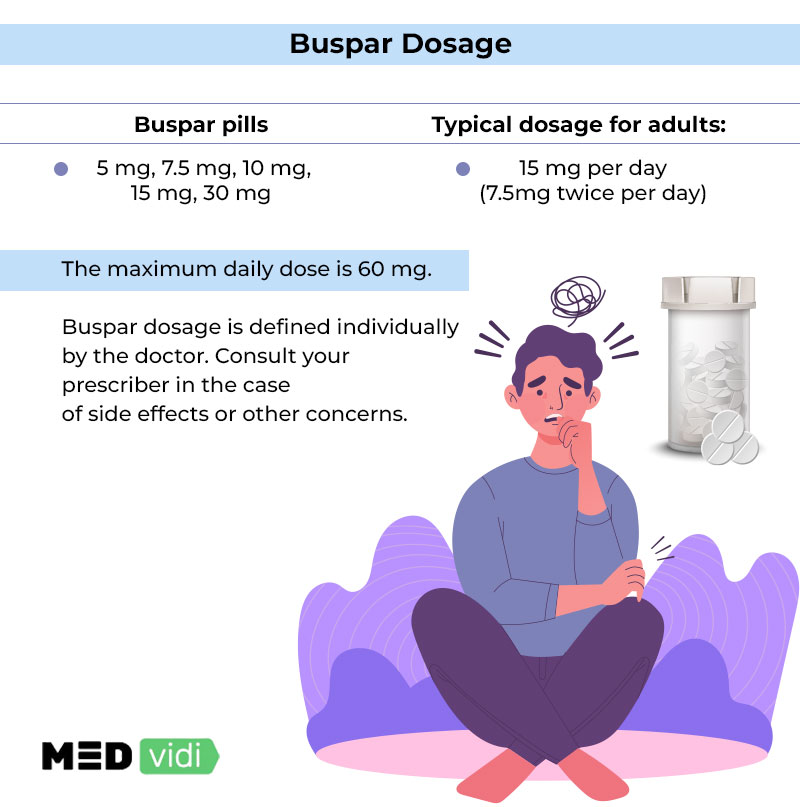Buspirone, an anti-anxiety medication approved by the Food and Drug Administration (FDA), is successfully used to treat generalized anxiety disorder (GAD).
Buspirone is still referred to by both the brand name BuSpar and its generic name. It is used alone or combined with other anxiety treatments, such as psychotherapy. BuSpar may also be recommended if previous anxiety drugs failed to work or caused too many unwanted side effects.
There is a lot more to know about BuSpar for anxiety. Continue reading to find out the medication’s uses, dosage, and side effects.
What Is Buspirone Used for?
Buspirone reduces anxiety symptoms. However, it is typically not used to treat mild anxiety or tension brought on by daily stress. The most common application of buspirone is to treat generalized anxiety disorder (GAD). However It is frequently used off-label and is less effective for
Depending on your doctor’s or pharmacist’s instructions, you may be prescribed this medication for other purposes. For example, for depression, insomnia, panic attacks, itchiness, withdrawal symptoms from alcohol, seizures, nausea, or vomiting. According to one
How Does Buspirone for Anxiety Work?
Buspirone belongs to the azapirone drug class and includes various antipsychotic and anxiolytic medications. It affects the brain’s neurotransmitters serotonin and dopamine, which means it makes serotonin receptors more active, and that lessens anxiety.
If other medications are ineffective or have too many negative effects, BuSpar may be administered. The clinical benefits of BuSpar take two to four weeks to manifest. Because of this, it will likely take you about a month of using this medicine before you can tell if it is effective for you.
Buspar vs. Other Anti-anxiety Meds
Other anti-anxiety drugs, such as benzodiazepines, are regarded to be the most effective for short-term anxiety relief, particularly in panic disorders. BuSpar is non-addictive and is not sedative, which is a significant advantage over benzos or other anti-anxiety drugs. Also, BuSpar is a wonderful option for people who want to feel less stressed without sleepiness or are afraid of becoming dependent on medicines.
Some
Buspirone Dosage for Anxiety
The dosage for each patient is determined by several parameters. These include the condition being treated, the patient’s age, the severity of the sickness, any coexisting disorders, and how the patient responds to the first dose. The best person to choose the appropriate dose for you is your doctor.
Pills of BuSpar come in strengths of 5 mg, 7.5 mg, 10 mg, 15 mg, and 30 mg. Commonly prescribed BuSpar dosages are as follows.
- For adults: Typically, the dosage is 15 mg per day (7.5 mg twice per day). The maximum daily dose can be 60 mg.
- For older people: The doctor could begin by administering the lowest dose because older people’s kidneys or liver might not function as well as they formerly did. Their body may metabolize medications more slowly as a result.

BuSpar Side Effects
Usually, many people tolerate BuSpar well, and side effects are not always present. Some patients, though, can have negative effects. Keep in mind that when you initially begin taking anxiety pills, side effects (including sleepiness or dizziness) could be more apparent.
The intensity of side effects can also increase when the dose is increased. However, your body will eventually become used to these symptoms, and they should eventually go away. Typical negative consequences include:
- Dizziness
- Restlessness
- Nausea
- Nervousness
- Headache
- Insomnia (Rarely)
Buspirone Interactions
Make sure you are aware of any potential drug interactions that may occur prior to starting a new medicine. The following are some of the most notable drugs that may
Monoamine oxidase inhibitors (MAOIs) | Both drugs together have the potential to significantly increase serotonin levels, which may result in serotonin syndrome (a condition that can be fatal if left untreated that is brought on by an excess of serotonin in the body.) |
Erythromycin | Is a common antibiotic. When administered orally, it can increase the body’s concentration of buspirone. |
Specific anti-seizure medications | Anti-seizure medications like Tegretol and Dilantin can reduce the body’s buspirone levels. As a result, Buspirone’s effects might not be as strong. |
Note: This list of potential medication interactions is not all-inclusive. It just includes a few of the more typical ones. It’s good to provide your doctor with a list of all the drugs, vitamins, and supplements you are taking.‘
Precautions
If you’ve been taking BuSpar regularly for a while, it’s crucial that your doctor keeps track of your progress. In addition, the following safety measures must be taken into account to guarantee the efficacy and security of long-term drug use.
- Tell your doctor if you have any allergies. Inactive chemicals in this product can trigger allergic reactions or other issues.
- Tell your doctor if you have a kidney or liver problem. Because BuSpar might not be a good choice in that case.
- Avoid drinking alcohol with the drug.
- BuSpar should be used with caution during pregnancy on doctor’s advice if the benefit outweighs the risk to the fetus and mother.
Bottom Line
Treatment for anxiety is essential. It can increase your susceptibility to other ailments; it is not just unpleasant to endure. Using BuSpar for fear and anxiety can help you manage your symptoms. However, it’s best to do your research. Ultimately, your doctor alone has the last say in whether or not a medicine is right for you. To make the right option regarding anxiety treatment online, connect with doctors at MEDvidi.













